|
Victoria Walker writes....
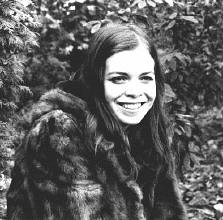 “Thirty-five years ago, when I was
twenty-one, I was idling away time at my
parents’ house in the country, wondering
what to do next. I had been living in
London and taking music lessons and it
had dawned at last that I had no musical
talent whatsoever. So with no particular
end in view I found my mother’s portable
typewriter and wrote a story for
children. Of course I wrote it for
myself, really. I may have looked
grownup - a heavy Juliette Greco fringe,
so much eyeliner that my father
complained that it was like looking down
the barrels of the guns of Navarone over
breakfast, reeking of Shalimar and
French cigarettes (rolled in papier mais
for super sophistication) - but I was
extraordinarily naive. It simply never
occurred to me to get a job or to think
of a career. Instead I spent eight
months, off and on, writing this story
just as it came into my head, sentence
by sentence, with no idea of how it
would finish or what I would do with it
when it had. “Thirty-five years ago, when I was
twenty-one, I was idling away time at my
parents’ house in the country, wondering
what to do next. I had been living in
London and taking music lessons and it
had dawned at last that I had no musical
talent whatsoever. So with no particular
end in view I found my mother’s portable
typewriter and wrote a story for
children. Of course I wrote it for
myself, really. I may have looked
grownup - a heavy Juliette Greco fringe,
so much eyeliner that my father
complained that it was like looking down
the barrels of the guns of Navarone over
breakfast, reeking of Shalimar and
French cigarettes (rolled in papier mais
for super sophistication) - but I was
extraordinarily naive. It simply never
occurred to me to get a job or to think
of a career. Instead I spent eight
months, off and on, writing this story
just as it came into my head, sentence
by sentence, with no idea of how it
would finish or what I would do with it
when it had.
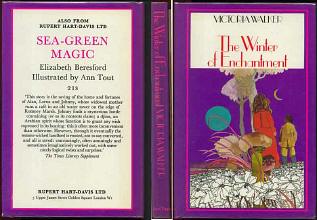 "One evening I went out to dinner with a
friend in London. In the late Sixties
the Bistro D’Agran - I’m not sure how you
spell that - was a well-known Hooray
Henry haunt behind Harrods. It was
unlicensed so customers had to bring
their own bottles of wine. I can’t
remember who the friend was but at the
table next to us were two men who asked
to borrow our corkscrew. During the
conversation that followed one of the
men revealed that he was a publisher.
Without a blush I told him that I was
within days of finishing a manuscript.
It did not occur to me that he might be
constantly bothered by people asking him
to look at unsolicited manuscripts.
Generously he said I could send it to
him for appraisal. I did. A few weeks
later, during which I had heard nothing
and had practically forgotten about it,
he sent me a contract. That was Bill
McCreadie of Rupert Hart-Davis (now of
Aurum Press) and the story came to be
called The Winter of Enchantment. "One evening I went out to dinner with a
friend in London. In the late Sixties
the Bistro D’Agran - I’m not sure how you
spell that - was a well-known Hooray
Henry haunt behind Harrods. It was
unlicensed so customers had to bring
their own bottles of wine. I can’t
remember who the friend was but at the
table next to us were two men who asked
to borrow our corkscrew. During the
conversation that followed one of the
men revealed that he was a publisher.
Without a blush I told him that I was
within days of finishing a manuscript.
It did not occur to me that he might be
constantly bothered by people asking him
to look at unsolicited manuscripts.
Generously he said I could send it to
him for appraisal. I did. A few weeks
later, during which I had heard nothing
and had practically forgotten about it,
he sent me a contract. That was Bill
McCreadie of Rupert Hart-Davis (now of
Aurum Press) and the story came to be
called The Winter of Enchantment.
" I was mildly gratified and grateful for
the fifty pounds advance. The book sold
quite well and was made into a
television serial. But by then my
thoughts were elsewhere. With money left
me by my grandfather I 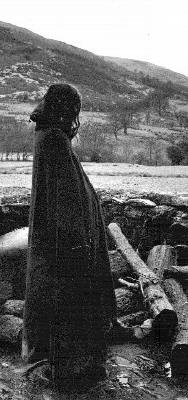 bought a hill
farm in mid-Wales and began to live the
rural idyll. We had forty Welsh black
cows and two hundred sheep and a ruined
farmhouse in an otherwise unpopulated
valley. It was extraordinarily
beautiful. A river ran through it,
passing the farmhouse door. Islands in
the river were shaded by trees, the
sides of the valley were rocky and
covered with bracken. Not a hedge or a
fence or a pylon were visible. We had no
electricity or telephone. Our only
plumbing was a cold water tap that came
from a well behind the house. Not
surprisingly everyone who came to stay
got paratyphoid. We cooked over an open
fire in a black pot that we had found
lying outside. The house had no glass in
the windows and during the first winter
one of the gable end walls fell down
during the night so we sat by the fire
looking out on snowy hills. I don’t
remember thinking then that this was a
strange way to live. bought a hill
farm in mid-Wales and began to live the
rural idyll. We had forty Welsh black
cows and two hundred sheep and a ruined
farmhouse in an otherwise unpopulated
valley. It was extraordinarily
beautiful. A river ran through it,
passing the farmhouse door. Islands in
the river were shaded by trees, the
sides of the valley were rocky and
covered with bracken. Not a hedge or a
fence or a pylon were visible. We had no
electricity or telephone. Our only
plumbing was a cold water tap that came
from a well behind the house. Not
surprisingly everyone who came to stay
got paratyphoid. We cooked over an open
fire in a black pot that we had found
lying outside. The house had no glass in
the windows and during the first winter
one of the gable end walls fell down
during the night so we sat by the fire
looking out on snowy hills. I don’t
remember thinking then that this was a
strange way to live.
"I lived there with two men, a Polish
count - so he said - and an Englishman who
had been in prison for ten years for
killing a man - accidentally, he said.
Looking back I wonder what on earth I
thought I was doing. I suppose the
Sixties and flower power had made risk
an essential part of the well-lived
life. The accidental assassin was
probably a fundamentally decent man but
the Polish count was horrid. I was going
to say ‘wicked’ but it has just occurred
to me as I write this that there are
uncomfortable parallels about living in
an isolated beautiful place with a
malevolent bully - let’s not be
fanciful. Like characters from Wuthering
Heights, never speaking except in a
snarl, occasionally actually coming to
blows, we waded through torrents of rain
and seas of mud. I fear the animals may
have suffered under our inexperienced
stewardship and what I saw there made me
a vegetarian for life. The rural idyll
was one of the circles of hell. After
three years I left in tears. We never
did get glass put in the windows.
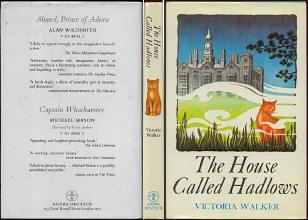 "But I did find time between trying to
get cows out of bogs and chickens out of
foxes to write a sequel to The Winter of
Enchantment. I wrote it with the same
ingenuous passion. If these stories have
any merit it must be that they are
innocent and childlike, written by one
who was essentially still a child
herself. Bill McCreadie, ever patient,
ever kind - for I’m sure I was a complete
pain, always in the throes of some drama
of my own making -had moved to Andre
Deutsch so I changed publishers with
him. This time I had an advance of
seventy five pounds. This was The House
Called Hadlows. "But I did find time between trying to
get cows out of bogs and chickens out of
foxes to write a sequel to The Winter of
Enchantment. I wrote it with the same
ingenuous passion. If these stories have
any merit it must be that they are
innocent and childlike, written by one
who was essentially still a child
herself. Bill McCreadie, ever patient,
ever kind - for I’m sure I was a complete
pain, always in the throes of some drama
of my own making -had moved to Andre
Deutsch so I changed publishers with
him. This time I had an advance of
seventy five pounds. This was The House
Called Hadlows.
" After I left the farm in Wales I lived
on my own for a while on the shores of
Skye. I was extremely lonely but it was
an opportunity for some long overdue
reflection. I realised that I needed to
learn. I had been to a soppy girls
boarding school, which didn’t take
women’s education seriously and anyway I
didn’t listen. So I went to Cambridge as
a mature student to read English and
there I discovered that there was such a
thing as structure, pace, cadence,
style, good and bad writing. This was
useful but it also closed a door. I
could never again write in prelapsarian
innocence.
"I married immediately after graduating,
had two children, took up gardening with
enthusiasm, was happy and occupied. Over
a period of about four years I wrote
another novel for children, different
from the others. Better or worse I
cannot tell. I tried half-heartedly to
find a publisher. The market for
children’s books had changed, I was
told. Fantasy adventures were unpopular.
Most children preferred television and
the computer games that were just then
being produced so literature had to be
snappy, realistic, above all short.
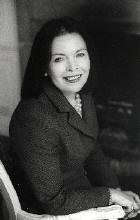 "So I began to write for adults and in
1997 the first of six novels (so far)
appeared under my married name of
Victoria Clayton. I suppose whole years
may have gone by without my remembering
those two stories for children, written
so long ago by someone I now hardly
recognise as me. When Ibooknet member
Graeme Roberts of Magpie Books
got in
touch with me to say that there was
still interest in The Winter of
Enchantment and the House Called Hadlows
I was astonished. I knew that for some
children years ago they had been
important - in as far as they provided
landscapes for the imagination as some
books read in childhood do - because
they had written to tell me so but I
didn’t think that they might have
remembered them thirty years later. I am
delighted that they have.” "So I began to write for adults and in
1997 the first of six novels (so far)
appeared under my married name of
Victoria Clayton. I suppose whole years
may have gone by without my remembering
those two stories for children, written
so long ago by someone I now hardly
recognise as me. When Ibooknet member
Graeme Roberts of Magpie Books
got in
touch with me to say that there was
still interest in The Winter of
Enchantment and the House Called Hadlows
I was astonished. I knew that for some
children years ago they had been
important - in as far as they provided
landscapes for the imagination as some
books read in childhood do - because
they had written to tell me so but I
didn’t think that they might have
remembered them thirty years later. I am
delighted that they have.”
Photo
Jerry Bauer
|

